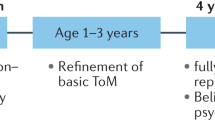Abstract
This paper summarizes a theory of cognitive development that argues that the mind develops across three fronts. The first refers to a general processing system that defines the general potentials of mind to develop cognitive strategies and skills. The second refers to a hypercognitive system that governs self-understanding and self-regulation. The third involves a set of specialized structural systems which are responsible for the representation and processing of different reality domains. There are specific forces which are responsible for this organization of mind. These are expressed in the paper in terms of a set of five organizational principles. The developmental course of the major systems is outlined. Developmental change is ascribed by the theory to the interaction between the various systems. Different types of development require different change mechanisms. Several studies are outlined in the paper which provide empirical support to each of these propositions. The theoretical and educational implications of this project are discussed in the concluding section of the paper.
Similar content being viewed by others
References
Bendler, P. H. (1989).EQS: Structural Equations Program Manual, BMDP Statistical Software, Los Angeles.
Case, R. (1985).Intellectual Development: Birth to Adulthood Academic Press, New York.
Demetriou, A. (August, 1991). Structure and Development of CausalExperimental Thought. Paper presented at the Fourth Conference of the European Association for Research on Learning and Instruction. Turku, Finland.
Demetriou, A., and Efklides, A. (1985). Structure and sequence of formal and postformal thought: General patterns and individual differences.Child Devel. 56: 1062–1091.
Demetriou, A., and Efklides, A. (1988). Experiential structuralism and neo-Piagetian theories: Toward an integrated model. In Demetriou, A., (ed.),The Neo-Piaqetian Theories of Coqnitive development: Toward an Integration North-Holland, Amsterdam, pp. 173–222.
Demetriou, A., and Efklides, A. (1989). The person's conception of the structures of developing intellect.Genet., Soc., Gen. Psychol. Monogr. 115: 371–423.
Demetriou, A., Efklides, A., and Platsidou, M. (1993). Experiential structuralism: A frame for unifying cognitive developmental theories. Monogr. Soc. Res. Child Devel. 58 (Serial Number 234).
Demetriou, R., Gustafsson, J.-E., Efklides, A., and Platsidou, M. (1992). Structural systems in developing cognition, science, and education. In Demetriou, A., Shayer, M., and Efklides, A. (eds.),The Modern Theories of Cognitive Development Go to School pp. 79–103. Routledge, London.
Demetriou, A., Platsidou, M., Efklides, A., Metallidou, Y., and Shayer, M. (1991). The development of quantitative-relational abilities from childhood to adolescence: Structure, scaling, and individual differences.Learn. Instr.: J. Eur. Assoc. Res. Learn. Instruct. 1: 19–43.
Flavell, J. H. (1979). Metacognition and cognitive monitoring: A new area of cognitive developmental inquiry.Am. Psychol. 34: 906–911.
Flavell, J. H. (1985).Cognitive Development Prentice-Hall, Englewood Cliffs, NJ.
Flavell, J. H. (1989). The development of children's knowledge about the mind: From cognitive connections to mental representations. In Astington, J. W., Harris, P. L., and Olson, D. R. (eds.),Developing Theories of Mind Cambridge University Press, Cambridge.
Gustafsson, J.-E. (August 1991). Hierarchical Models of Intelligene and Educational Achievement. Fourth Conference of the European Association for Research on Learning and Instruction, Turku, Finland.
Halford, G. S. (1988). A structure mapping approach to cognitive development. In Demetriou, A. (ed.),The Neo-Piagetian Theories of Cognitive Development: Toward an Integration North-Holland, Amsterdam, pp. 103–136.
Noelting, G. (1980). The development of proportional reasoning and the ratio concept. Part I — Differentiation of stages.Educ. Stud. Math. 11: 217–253.
Pascual-Leone, J., and Goodman, D. (1979). Intelligence and experience: A neo-Piagetian approach.Instruct. Sci. 8: 301–367.
Resnick, L. B., Bill, V., and Lesgold, S. (1992). Developing thinking abilities in arithmetic class. In Demetriou, A., Shayer, M., and Efklides, A. (eds.),The Modern Theories of Cognitive Development Go to School (pp. 210–239). Routledge, London.
Stroop, J. R. (1935). Studies of interference in serial verbal reactions.J. Exp. Psychol. 18: 643–662.
Author information
Authors and Affiliations
Rights and permissions
About this article
Cite this article
Demetriou, A. In quest of the functional architecture of the developing mind: The Aristotelian project. Educ Psychol Rev 5, 275–292 (1993). https://doi.org/10.1007/BF01323048
Issue Date:
DOI: https://doi.org/10.1007/BF01323048




